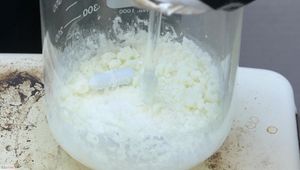Mercury(II) nitrate
 Nearly dry mercury(II) nitrate
| |
| Names | |
|---|---|
| IUPAC name
Mercury(II) nitrate
| |
| Other names
Citrine ointment
Mercuric nitrate Millon's reagent | |
| Properties | |
| Hg(NO3)2 | |
| Molar mass | 324.60 g/mol (anhydrous) |
| Appearance | White solid |
| Odor | Odorless |
| Density | 4.3 g/cm3 (monohydrate) |
| Melting point | monohydrate 79 °C (174 °F; 352 K) |
| Boiling point | Decomposes |
| Soluble | |
| Solubility | Soluble in acetone, ammonia, hydrochloric acid, nitric acid Insoluble in alcohol, halocarbons, hydrocarbons |
| Vapor pressure | ~0 mmHg |
| Hazards | |
| Safety data sheet | Sigma-Aldrich (monohydrate) |
| Flash point | Non-flammable |
| Related compounds | |
| Related compounds
|
Zinc nitrate Cadmium nitrate |
| Except where otherwise noted, data are given for materials in their standard state (at 25 °C [77 °F], 100 kPa). | |
| Infobox references | |
Mercury(II) nitrate (Hg(NO3)2) is a very toxic white soluble crystalline mercury(II) salt of nitric acid. It was used in the past to treat fur to make felt in a process called "carroting". The phrase 'mad as a hatter' is associated with psychological illness brought on by excessive exposure to mercury(II) nitrate.
Contents
[hide]Properties
Chemical
Mercury(II) nitrate decomposes when heated, releasing nitrogen dioxide and oxygen.
- Hg(NO3)2 → HgO + 2 NO2 + ½ O2
Physical
Mercury(II) nitrate is a white solid, soluble in water and nitric acid.
Availability
Mercury(II) nitrate is sold by chemical suppliers, however, due to its hazards it's extremely difficult to get hold of.
The sale of mercury(II) nitrate, like most mercury compounds, is restricted in many countries due to it's great toxicity. Its sale in EU is banned without a proper hazardous substance permit.
Preparation
Mercury(II) nitrate can be prepared by reacting elemental mercury with concentrated nitric acid. Heat speeds up the reaction.
- 4 HNO3 + Hg → Hg(NO3)2 + 2 NO2 + 2 H2O
To dry it, the solution is gently heated until the compound solidifies. Do not heat it too high as it will decompose.
If diluted nitric acid is used instead, mercury(I) nitrate will be formed.
Projects
- Make mercury(II) oxide
- Make mercury(II) chloride
Handling
Safety
Mercury(II) nitrate is extremely toxic. It can absorb through skin. Wear proper protection when handling the compound.
Storage
Mercury(II) nitrate should be stored in closed bottles, with a proper hazard label, indicating it's a dangerous compound. Plastic (PE or PP) bottlers are ideal, as they will not break if they're dropped on a hard surface, like the floor.
Disposal
Mercury(II) nitrate should be converted to an insoluble form, such as mercury sulfide then taken to hazardous waste disposal centers.